Interview with HELLBLAZER author Jamie Delano
Jamie Delano began writing comics professionally in the early 1980s. He is best known as the first writer of the comic book series Hellblazer, featuring John Constantine.
In addition to diverse comics work, Jamie has experimented with screenwriting, and in 2012 published “Book Thirteen”, a novel. This was followed by “Leepus: DIZZY” in 2014 and “Leepus: THE RIVER” in 2017. All his novels are available from his Lepus Books imprint.
Jamie lives in semi-rural Northamptonshire with his partner, Sue. They have three adult children and a considerable distraction of grandchildren.
How did you become involved in writing the Hellblazer series?
Having always vaguely planned to ‘be a writer someday’ but failing to do anything to make it happen, I was urged into working in British comics in the early 1980s by my then hometown friend Alan Moore. After a few years working on and off on various publications – Night Raven, Dr Who, Captain Britain, etc – and submitting a proposal for a series at DC, I was offered the chance by Karen Berger to develop Moore’s John Constantine into the lead of an ongoing monthly. It was felt a British writer was required for the putative title and, I guess, I was handy and fit that description.
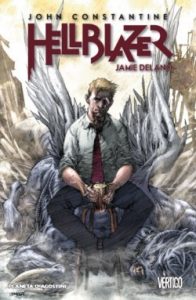
How much of a role did you have in shaping John Constantine’s character and adventures during your 40 issue run?
Given the strength of the character Moore had created provided a mighty springboard, I had pretty much a free hand in how character and storylines went going forward. Although in fact this ‘free hand’ largely consisted of trying to keep in touch with Constantine as he led off reckless across multiple pages and psychic dimensions, and maintaining an illusion of control to keep editorial anxiety at bay.
Did you have a set ending for your Hellblazer run from the beginning? Why did you leave the title?
To be honest, other than the first half-dozen issues, for which I agreed outlines with Karen (with advice from Moore), I had little idea where the series was going until it got there. I’ve always been a seat-of-the-pants flyer, trusting (sometimes foolishly perhaps) to let my characters define the progress of their own stories. This is not a tactic I would retrospectively recommend to series writers – the tension thus engendered as deadlines approach and plot-threads are trailing all over in a hopeless tangle can tend towards the mentally exhausting.
And, in the end, I guess that’s why I left the title; it became a little all-consuming. I was always happy to go back and don the fusty old trenchcoat from time to time though.
How much of your own personality and character traits made it in to John’s character?
Probably more than I’d like to admit to – although my gambles are generally much less high-stakes.
You were one of the writers that signalled in the ‘British Invasion’ in comics, along with Alan Moore and Neil Gaiman. What is it about the aesthetic shift ushered in by yourself and your peers that has remained so enduring over the years?
That’s probably a question best answered by critics. I suspect that perhaps we took the opportunities offered by the medium more seriously than perhaps was the tradition in US comics, and brought fresh cultural influences from which to draw inspiration…
I’m always reluctant to cop for the ‘Invasion’ tag, though. As I recall we were flattered by editorial attention and invitations to enjoy fine dining… not to mention the prospect of earning a halfway decent living through writing, supported by dollars.
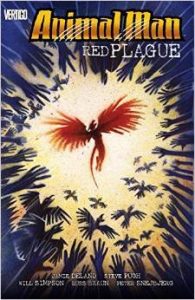 Your run on Animal Man following Grant Morrison is one of my prized collections. What was your vision for the character following such an acclaimed run?
Your run on Animal Man following Grant Morrison is one of my prized collections. What was your vision for the character following such an acclaimed run?
Thanks. I’m still fond myself of the way that all turned out. But my tenure was entirely accidental. I had zero knowledge of the character before then editor Tom Peyer called me up one evening to say he had found himself short of a writer at short notice, and would I like to help him out by covering for a short run on the series. In a moment of weakness I said ‘yes’, embarked on a quick catch up of preceding storylines, advised Tom of the undoubted need for strict editorial oversight of anything pertaining to continuity, and got on with the seat-of-the pants stuff. As the writing progressed, and enthused by Steve Pugh’s renditions of the stories, I developed a real affection for the characters, which made the writing (unusually for me) a lot of fun. I hope that came through in the eventual output.
Who were some of your biggest literary influences?
I’m glad you say ‘some’; I have too many to list, or even remember. It was my mother who infected me with the word virus, reading me the ‘classics’, or child-friendly versions of them, when I was still pre-school – Rudyard Kipling, Robert Louis Stevenson, Lewis Carroll, etc. When I could read for myself I devoured mythology and schoolboy adventure series in equal measure. In my adolescence, fantasy and sci-fi predominated – Howard, Conan Doyle, Moorcock, Disch, Vonnegut, LeGuin, Dick, Delaney etc, and, of course, J G Ballard. Later I paid a lot of attention to Burroughs, Pynchon, Donleavy, Flann O’brien… Robert Stone, M R James, Angela Carter, James Ellroy, Kerouac, Garcia Marquez, Doris Lessing, Cormac McCarthy…. Is that enough now?
I notice many of your stories from Hellblazer , to 20/20 Visions to Outlaw Nation are quite politically charged. Have you ever been tempted to jump in to a comic series that addresses our present political climate?
If I do ever write another comic series it will inevitably address in some way the current political/cultural shitstorm. I am incapable of remaining aloof from the world in which I and my readers are forced to live. That is ultimately the fuel that drives me as a writer. There are doubtless many more effective ways to treat with and influence the reality of our existence than through writing weird fiction but, for good or ill, that is the only skill I have.
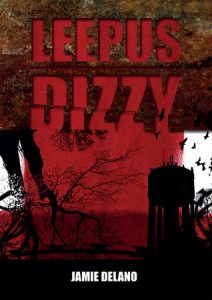 You’ve recently decided to switch from comics to prose novels, much like some of your contemporaries. Why the change?
You’ve recently decided to switch from comics to prose novels, much like some of your contemporaries. Why the change?
From an early age I envisioned myself as a writer, probably of novels, but for many years I was distracted by the need to earn a living and lacked the energy and contacts required to apply myself to pursuing a literary career. Consequently I built up a considerable list of ‘dust-jacket’ jobs, as I saw them, but remained only an amateur writer, until Moore prodded me into comics. Thereafter I was consumed for years by the need to meet deadlines, working steadily in that medium, and enjoying it, largely. Then, a decade or so ago, I began feel that it was becoming a bit of a struggle to find the right niche in comics creation for the kinds of things I was attracted to doing (not that I really knew what they were); so I eased back a bit on writing in general and wasted a few years mooching around and getting grumpy. Then suddenly I realised I was fast approaching the age of sixty, and that if I didn’t soon get my shit together and write at least one novel it would soon be too late. So I forced myself back into my study and sat down to see if I could actually do it. My first attempt – BOOK THIRTEEN (featuring an Old Writer, a bit blocked and demented with trying to keep the plotlines of his family members running smoothly) turned out readable at least – so I adopted a suicidal (zero) marketing strategy and decided to set up my own tiny cooperative imprint and self-publish. There is no financial reward in this course of action, but I get a great deal of satisfaction from being responsible for the creative process from start to finish. The downside, of course, is that there is no one else to blame for the inevitable errors.
So, in BOOK THIRTEEN the Old Writer has enjoyed some success with a cult series of weird fictions featuring an odd ‘psychic detective’ called ‘Leepus’. Which leads me to your next question…
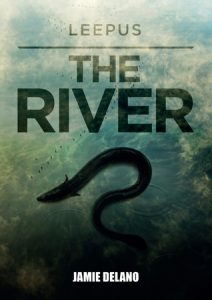 Your Leepus series of novels is quite a brilliant alternate universe detective story. Describe the series to new potential readers who may not have discovered it yet.
Your Leepus series of novels is quite a brilliant alternate universe detective story. Describe the series to new potential readers who may not have discovered it yet.
At the end of BOOK THIRTEEN his character, Leepus, manifests to the Old Writer.
Wanting to attempt something a little more genre with my next book, it seemed like a good idea to write a version of the character invented by the Old Writer – so I placed in him the shattered, alternate reality civilisation of Inglund and turned him loose. Existing in the aftermath of some apocalyptic convergence, referred to only as The Reduction, Inglund is a weird and anarchic political and cultural landscape in which anything goes. Leepus struggles against the odds to find good outcomes for the tribulations of the disparate people surviving there he cares for. On one level the (so far) two stories – Leepus: DIZZY and Leepus: THE RIVER – are wild, sometimes violent, often scatological dystopian adventures (although I’m not totally onboard with ‘dystopian’, finding a sly pleasure in regarding the opportunities presented by the scenario as more utopian); on another level, there is a metafictional subtext going on, dealing with a writer’s ‘madness’ and the complexity of his relationship with his imagination – although this level can fairly easily be ignored by any reader who can’t be bothered with such nonsense. I’m really enjoying this sojourn in unruly Inglund and plan to explore it a lot further if given the time. I’d be delighted if anyone wanted to share that exploration with me, but I’ll be travelling on whatever.
For any who prefer to be read to, I’m currently struggling with recording audiobook version of the novels so far; it’s hard though, my voice is undisciplined and some of the characters have unmanageable accents…
Are you a fan of Joyce? I couldn’t help but feel traces of Ulysses and even Finnegan’s Wake while reading.
I haven’t read any Joyce for years, but such a distinctive style doubtless made an impression on some level. I did chance to pick up a J P Donleavy book a while back though (someone I enjoyed reading a lot in my early twenties) and was surprised to recognise a certain sentence structure, lack of commas, which evoked aspects of the syntax deployed in my Leepus writing.
Speaking of writers who have written massive tomes, have your read Alan Moore’s Jerusalem? If so what did you think?
I read the first few chapters, and then, through fear the tiny print would destroy what remains of my eyesight, listened to the rest as an audiobook. It’s a glorious monster – occasionally irritating in its typically Mooreish compendiousness, but overall a magnificent piece of work, which frequently displays a mastery of imagery and language which I can only envy. Not an easy read, but I’d recommend anyone making the effort.
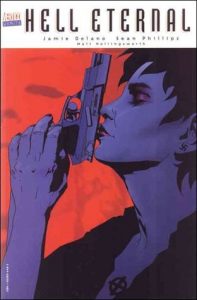 If you had to pick a favorite work of yours, maybe one slightly less known, which would it be and why?
If you had to pick a favorite work of yours, maybe one slightly less known, which would it be and why?
Off the top of my head I might pick HELL ETERNAL. Beautifully drawn by Sean Phillips, it’s a work based on a true story which captured my attention at the time (1990s), and features a trio of weird, middle-class British neo-Nazis who ultimately come to grief in the USA. Writing their story intrigued me. Trying to understand their, to me, alien mindset, and fill in the gaps between waypoints of reported fact and ‘explain’ their fates through fictionalising the missing bits was a personally absorbing, somewhat chilling but ultimately satisfying creative exercise.
When you are not writing, what takes up most of your time ?
Three adult children and their five offspring, all living locally, and several ageing parents occupy a lot of headspace. I spend quite a lot of time mooching about the countryside, alone or in company of my wife, poking my nose into odd corners of geography, history and nature. Other than that, I tend to sit still at home a fair bit watching my peyote cacti grow millimetre by millimetre; occasionally I dream a bit, or play online poker.
What can we look forward to from you creatively in the near future?
Definitely more Leepus. I have offers to propose new comics by which I am seriously tempted; I’ll probably succumb to one of these at least if the right idea presents, but so far it hasn’t.
Good luck, and thanks for joining us, Jamie!
